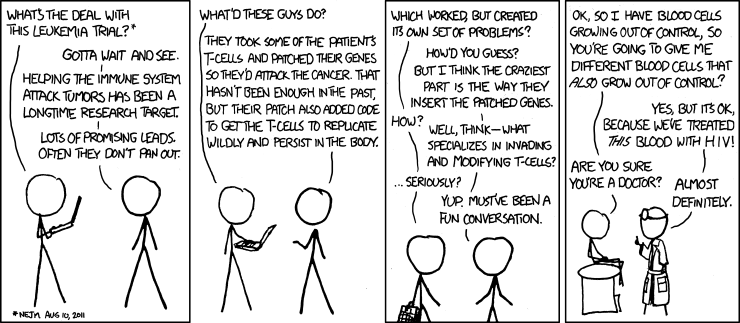Today's xkcd is timely.

Here is the news article that's being referenced in the comic.
Fortunately, I saw this episode of Star Trek. I know what happens when you screw around with T-Cells. Be careful, science!

An illegal, Orwellian violation of free-speech rights? Or just a smart tactic to protect train passengers from rowdy would-be demonstrators during a busy evening commute?
The question resonated Saturday in San Francisco and beyond as details emerged of Bay Area Rapid Transit officials' decision to cut off underground cellphone service for a few hours at several stations Thursday. Commuters at stations from downtown to near the city's main airport were affected as BART officials sought to tactically thwart a planned protest over the recent fatal shooting of a 45-year-old man by transit police.
Two days later, the move had civil rights and legal experts questioning the agency's move, and drew backlash from one transit board member who was taken aback by the decision.
"I'm just shocked that they didn't think about the implications of this. We really don't have the right to be this type of censor," said Lynette Sweet, who serves on BART's board of directors. "In my opinion, we've let the actions of a few people affect everybody. And that's not fair."
Similar questions of censorship have arisen in recent days as Britain's government put the idea of curbing social media services on the table in response to several nights of widespread looting and violence in London and other English cities. Police claim that young criminals used Twitter and Blackberry instant messages to coordinate looting sprees in riots.
Prime Minister David Cameron said that the government, spy agencies and the communications industry are looking at whether there should be limits on the use of social media sites like Twitter and Facebook or services like BlackBerry Messenger to spread disorder. The suggestions have met with outrage — with some critics comparing Cameron to the despots ousted during the Arab Spring.
In the San Francisco instance, Sweet said BART board members were told by the agency of its decision during the closed portion of its meeting Thursday afternoon, less than three hours before the protest was scheduled to start.
"It was almost like an afterthought," Sweet told The Associated Press. "This is a land of free speech and for us to think we can do that shows we've grown well beyond the business of what we're supposed to be doing and that's providing transportation. Not censorship."